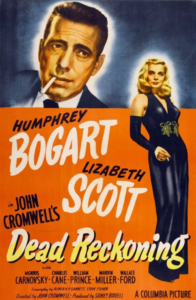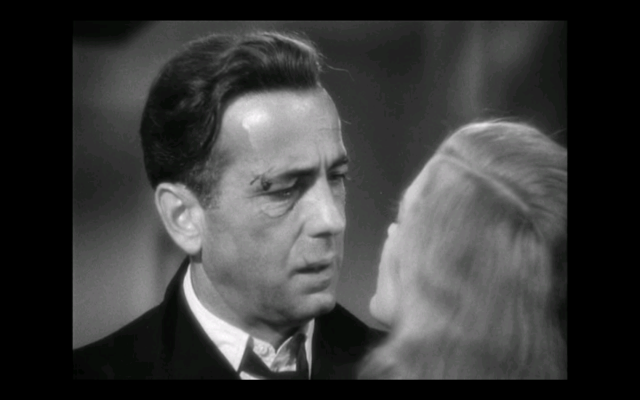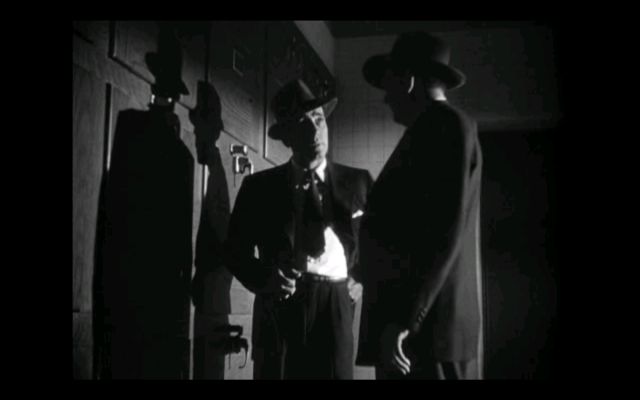“Didn’t I tell you all females are the same with their faces washed?”
|

Synopsis:
A war hero (Humphrey Bogart) investigates the mysterious death of his buddy (William Prince), who was accused of murdering the husband of his lover (Lizabeth Scott).
|
|
Genres, Themes, Actors, and Directors:
- Amateur Sleuths
- Femmes Fatales
- Flashback Films
- Humphrey Bogart Films
- John Cromwell Films
- Lizabeth Scott Films
- Veterans
Review:
Dead Reckoning is often dismissed as merely one of Humphrey Bogart’s “lesser” noirs — perhaps due to the presence of Lizabeth Scott (in lieu of Lauren Bacall) as Bogie’s femme fatale love interest, or perhaps due to its meandering storyline (scripted by no less than five authors), which occasionally lacks focus. Yet director John Cromwell and cinematographer Leo Tover do a fine job establishing an atmosphere of tension and intrigue throughout, and there’s enough deliciously hardboiled dialogue (“Stalled again — like a jeep on synthetic gas.”) to keep fans of the genre happy. Meanwhile, Bogart is as dependable as ever, and husky-voiced Scott isn’t nearly as bad as some reviews would lead you believe. While it’s not must-see viewing, Dead Reckoning is certainly recommended for one-time viewing.
Note: Be sure to check out David Sterritt’s insightful analysis of the film for TCM.
Redeeming Qualities and Moments:
Must See?
No, but it’s recommended.
Links:
|




One thought on “Dead Reckoning (1947)”
Not a must.
Yes, it’s directed and filmed well. But it also had too many cooks in the kitchen and the result is a screenplay a little too enamored of itself. It’s waaay over-written – with characters saying much more than they would say in given situations. (As well, in a number of scenes, intrusive and unnecessary narration thwarts what would be welcome tension.)
The film seems to be trying to out-Chandler Raymond Chandler – why bother? (Interestingly, perhaps…Scott’s character’s last name is Chandler.)
I wouldn’t say the film lacks focus. It just seems thick, like it’s trying too hard. Certain scenes work well but – as noted – with so many (ambitious) people writing the thing, strengths are bound to surface. (How Bogart gets rid of a body is a nice touch.)
It’s also a little sloppy: i.e., why introduce the character Bogart talks at-length in the church if we only discover his purpose is to allow backstory for the audience? No pay-off there.
The main problem with Scott (who I don’t find that appealing or capable here) is that her character, as played – without proper nuance, doesn’t ultimately make a whole lot of sense. (Which makes the twist at the end a few kinds of silly, really. Her final moment is laughable.)
Oddly, my favorite bit came from (uncredited) Ruby Dandridge as Mabel, the maid –
Dandridge: (to Bogart/Scott): Come back and see us again. Gulf City won’t be the same without you two.
Her delivery made me giggle.